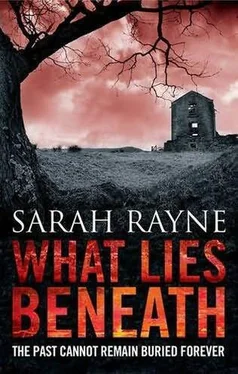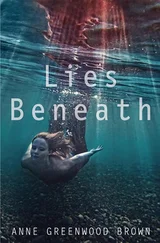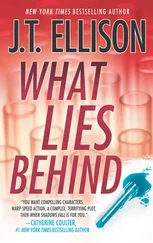It was unfortunate that as she handed Dr Martlet the cup, the long sleeve of her gown fell back, showing her forearm. The rash was particularly bad that day, crusted and bleeding, and although Serena pulled the sleeve down at once Dr Martlet had seen it.
He stared at her arm and, in a voice of unmistakable horror, said, ‘Lady Cadence, how long have you had those sores?’
‘Not very long. A few weeks. My wrists and ankles tend to swell – I told you that.’
‘Yes, but… May I look at your arm more closely?’
He did not touch her at all, but he looked carefully at the sores and asked if there were any others. ‘On your body? Between your legs?’
‘Oh, no,’ said Serena quickly. ‘This is only where the skin has cracked and become dry from the swelling. That’s all it is,’ she said, a bit desperately. ‘I usually put hand lotion on, but I forgot it this morning.’
‘Don’t put lotion of any kind on,’ he said. ‘It won’t help and it might make it worse.’ He sat back, looking at her, and incredibly there were tears in his eyes. ‘Oh, my dear Serena,’ he said. ‘I’ve prayed this wouldn’t happen.’
He had always addressed her as Lady Cadence before, but now, it was as if a mask, diligently kept in place all these years, had slipped. Serena was not offended because of his evident distress and concern. She said, ‘But they’re just patches of dry skin, aren’t they?’ Fool, she was saying to herself. You know what it is; you knew almost from the first appearance of the marks.
Dr Martlet sat very still for a moment, then he said, ‘I’m afraid it’s something far more serious than that.’
Serena heard herself say, ‘I’ve got the same disease as Julius, haven’t I?’
She willed him to say of course she had not; that it was just dry skin, or some condition resulting from the pregnancy. She was even hearing the comforting words in her mind.
Gillespie Martlet said, ‘Yes, I’m afraid you have.’
Serena sat very still for several minutes. Then she said, ‘Once, you told me that the disease my husband has can eventually affect the brain. Will that happen to me?’
‘In your husband’s case,’ he said, ‘the disease went untreated for far too long. He hid it from us all. For years, perhaps. In your case, though, we know about it early enough to try a number of treatments.’
‘How effective are the treatments, though?’
‘Some can be very good,’ he said, but Serena heard the note of evasion.
She said, ‘But if they aren’t effective – it could encroach on my brain?’
‘Yes,’ he said. ‘Yes, it could.’
1912
Before they left England, Dr Martlet had told Crispian the syphilis was encroaching on Julius Cadence’s brain. ‘I’ve been measuring the progress of it as far as one can measure such a thing,’ he said, ‘and it seems to me that there’s been quite a rapid deterioration in the last three months. It’s by no means a constant process, though, so it might slow down.’
‘But not reverse?’
‘I’m afraid not,’ said Martlet. ‘Crispian, you need to know that now it’s reached this stage – now the disease has a firmer hold of him – there will probably be episodes of violence and also extreme personality changes. Those episodes will become more pronounced and more frequent. And – I’m sorry, Crispian – but in the end you may find that not only does he not know you, you won’t know him. He’ll turn into a stranger.’
But as the ship left Italy and began the long haul around the coast of Greece, Julius seemed almost normal. They docked briefly at Patras, where Jamie went ashore to explore the ancient cathedrals and pursue the tradition of Byzantine music in the city. Crispian went with him, interested to see something of the place, leaving Julius with the ship’s doctor, who did not want to come, on the grounds that once you had seen one port you had seen most of them. He would spend his afternoon quietly on the ship, Dr Brank said, although he would be very grateful if one of them could bring back a bottle of the local wine. Perhaps a couple of bottles, in fact, or maybe best make it the round half-dozen while they were about it. He was by way of making a collection of wines of the world.
‘It’d be ungenerous to refuse that request,’ said Gil, and accompanied Crispian and Jamie for the first half-hour of the exploration, then proceeded to vanish.
By half-past four, Jamie and Crispian, meeting by arrangement in one of Patras’ squares, began to worry that something had happened to him. They set off to scour the city, finally running him to earth in a dim subterranean room where he was involved in a card game with six sinister-looking men of uncertain nationality and dubious probity.
Told they might miss the ship’s departure, he said, ‘Balls, dear boy. The ship would never sail without its wealthiest passengers.’
Pressed for an account of his activities, he said he had gone into the wine shop in quest of the doctor’s wine, had there been recognized as English, considered as a result to be lavishly rich and forcibly enlisted in the game that was in progress below the shop. Crispian and Jamie knew how it was with card games, he said; once you started playing, time ceased to exist.
‘But it’s been nearly five hours,’ said Crispian, furious.
‘That proves my point.’
He was unrepentant and amiable, and on the way back to the ship counted his winnings with satisfaction. After this, he listened with apparent interest to Jamie’s description of how he had managed to find a conservatoire devoted exclusively to Byzantine music and had been able to hear a little of one of the classes.
Crispian, who for the last couple of weeks had been deciding that Gil was not nearly as wild as gossip painted him, realized angrily he had been wrong. Gil was every bit as wild, and he was untrustworthy and reckless as well. Those strange and disturbing moments of closeness – intimacy, if you wanted to call it that – that had passed between them could be ascribed to nothing more than Gil’s mischievous streak. Crispian would put them very firmly from his mind and he would certainly not allow them to happen again.
They were several days out into the Aegean Sea when the last shreds of sanity fell away from Julius Cadence.
He and Crispian had been having breakfast together; Julius had been calm and lucid for several days and that morning had started to talk to Crispian about Cadences. Crispian, drinking his coffee, even wondered if it was possible the doctors might have been wrong about his father’s condition. He appeared pleased to be with Crispian, and he was wearing one of the linen jackets purchased for the trip with a silk scarf. His hair was brushed neatly and there was a faint scent of the expensive soap he always liked to use.
‘When I think what’s ahead, Crispian,’ he said, drinking his coffee, ‘I’m worried for the bank. There’re storm clouds gathering in Europe – you know that, of course?’
‘Yes, certainly.’
‘If there’s war it’ll affect the financial institutions. War always does.’
‘Will there be a war, d’you think?’ Please let this conversation go on, thought Crispian. Please let him stay like this – lucid and intelligent.
Julius said, ‘Yes, I think there’s going to be a war. And, other considerations apart, Cadences may have to ride out what’s called hyperinflation after it – that’s something that frequently follows wars. Your grandfather saw it happen after Crimea and the Transvaal, and to a lesser extent I saw it happen after the Second Boer War. Prices increase so rapidly that currency loses its value, you see. Coinage becomes debased. Cadences has never yet suffered an actual bank run, but if this war that’s brewing ravages its way across Europe, as the politicians say, then it might do so in the aftermath.’ He frowned, then said, ‘Not all wars are fought on battlefields.’
Читать дальше












